President Donald Trump awarded the Presidential Medal of Freedom on Wednesday to economist Arthur Laffer, whose disputed theories on tax cuts have guided Republican policy since the 1980s.
Laffer, 78, advised Trump during his presidential campaign and co-wrote a flattering book, "Trumponomics: Inside the America First Plan to Revive Our Economy." Laffer says lower tax rates change people's behavior and stimulate economic growth, creating more tax revenue for the government, not less.
Allies credit Laffer with helping to spur income tax reductions around the world and boosting national economies as a result. Critics say the tax cuts he has espoused over the years have not produced the promised results and have instead contributed to growing income inequality and soaring budget deficits.
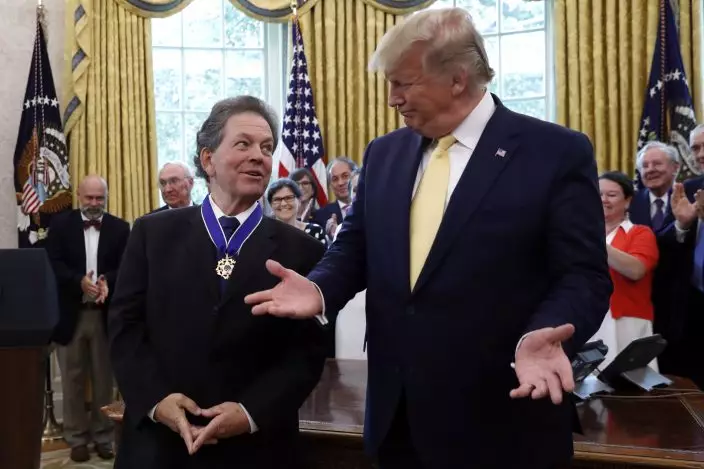
President Donald Trump talks with with economist Arthur Laffer after awarding him the Presidential Medal of Freedom Wednesday, June 19, 2019, in the Oval Office of the White House in Washington. (AP PhotoJacquelyn Martin)
Trump said that Laffer proved the best way to grow the economy and raise government revenue was not to increase tax rates but to adopt strong incentives "that unleash the power of human freedom."
"Few people in history have revolutionized economic thought and policy like Dr. Art Laffer," Trump said during a ceremony in the Oval Office.
Trump used the ceremony to highlight the state of the economy under his watch. The president credits his $1.5 trillion tax cut package for boosting the economy, which sported a 3.6 percent unemployment rate in May and has U.S. stock markets standing near record highs. But the federal deficit also soared. It's up nearly 40 percent through the first eight months of the budget year. He did not address that aspect of the tax cuts.
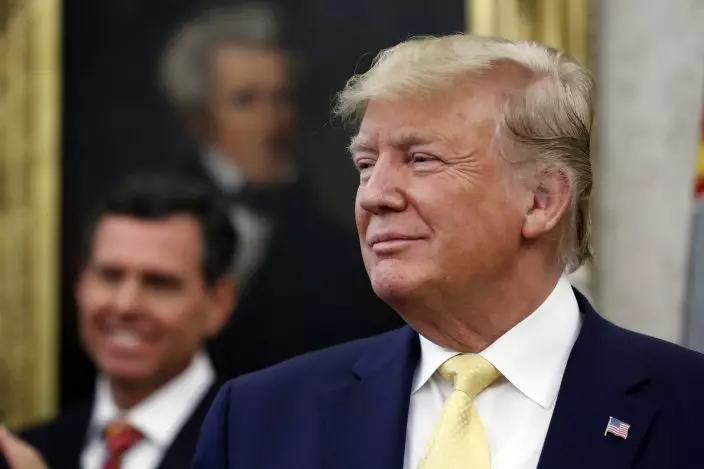
President Donald Trump listens before awarding the Presidential Medal of Freedom to economist Arthur Laffer, Wednesday June 19, 2019, in the Oval Office of the White House in Washington. (AP PhotoJacquelyn Martin)
Many Republicans justified their vote for the tax cuts by saying they would grow the economy to the extent that they would not increase the national debt.
Jared Bernstein, who served as an economic adviser to Vice President Joe Biden, said Laffer is probably the most influential economist living today. He said his biggest accomplishment is convincing politicians that tax cuts will pay for themselves.
"He had consistently espoused that tax cuts for the wealthy will generate significant growth, thereby helping pay for themselves and boosting the incomes of low and middle-income people. None of that has occurred," said Bernstein, now a senior fellow at the Center on Budget and Policy Priorities, a liberal think tank.
Laffer was also an adviser to President Ronald Reagan. He is sometimes referred to as the "father of supply-side economics" and his philosophy on taxes became known as "The Laffer Curve." He said he did not invent the Laffer Curve and quoted economist John Maynard Keynes in summarizing it. "Given sufficient time to gather the fruit, a reduction of taxation will run a better chance than an increase of balancing the budget."
Trump recounted how The Laffer Curve came into being during a 1974 dinner with Dick Cheney, Donald Rumsfeld and Wall Street Journal reporter Jude Wanniski.
"Art drew on his napkin a series of lines and a curve that changed history," Trump said. "Art showed that if tax rates are too high, people stop spending and they stop investing. The result is less growth and lower tax revenue. On the other hand, at a certain point in the curve, lower tax rates spur investment, economic growth and raise government revenue."
Laffer also advised then-Gov. Sam Brownback of Kansas on income tax cuts that state's conservative legislature approved in 2012 and 2013. But the economic boom envisioned did not pan out. Rather, persistent shortfalls prompted lawmakers to raise the state's sales tax, divert funds from highway projects, reduce contributions to public pensions and tighten spending on social services.
Voters came to view the Republican governor's experiment as a failure, and bipartisan supermajorities repealed most of the tax cuts in 2017 over Brownback's veto.
"Trumponomcs," whose co-author is Stephen Moore, describes Trump as a "gifted orator," ''shrewd," and "open-minded." Writing in Foreign Affairs, a former economic adviser to President George W. Bush described "Trumponomics" as the voice of "rah-rah partisans."
"The book's over-the-top enthusiasm for U.S. President Donald Trump's sketchy economic agenda is not likely to convince anyone not already sporting a 'Make America Great Again' hat," wrote N. Gregory Mankiw, now a professor of economics at Harvard University.
Trump considered nominating Moore to the Federal Reserve's Board of Governors, but Moore withdrew from consideration last month after losing Republican support in the Senate, largely over his past inflammatory writings about women.
Moore described Laffer as the most persuasive voice among Trump's advisers for cutting the corporate tax rate to 21 percent.
"Though the final verdict of how well this works remains unknown, the bump in growth and wages in our country, along with the record 7 million unfilled jobs, has provided vindication of the power of the Laffer model," Moore wrote in The Hill.
The Presidential Medal of Freedom is the nation's highest civilian honor, awarded for especially meritorious contributions to the security or national interest of the U.S., or for significant cultural endeavors.
SEOUL, South Korea (AP) — The United States and its allies are discussing options “both inside and outside the U.N. system” to create a new mechanism for monitoring North Korea over its nuclear weapons program, the American ambassador to the United Nations said Wednesday.
Russia last month vetoed a U.N. resolution in a move that effectively abolished monitoring by U.N. experts of Security Council sanctions against North Korea, which prompted Western accusations that Moscow was acting to shield its arms purchases from North Korea to fuel its war in Ukraine.
“I look forward to engaging with both the Republic of Korea and Japan, but like-minded (countries) as well, on trying to develop options both inside the U.N. as well as outside the U.N. The point here is that we cannot allow the work that the panel of experts were doing to lapse,” U.S. Ambassador Linda Thomas-Greenfield told a news conference in Seoul, using the formal name for South Korea.
Thomas-Greenfield didn’t provide specific details about U.S. discussions with allies and other partners, including whether an alternative monitoring regime would more likely be established through the U.N. General Assembly or with an independent entity outside of the U.N.
Thomas-Greenfield met with South Korean Foreign Minister Cho Tae-yul on Monday and they discussed unspecified “next steps to ensure a continuation of independent and accurate reporting” of North Korea’s illicit weapons development activities, according to her office.
Thomas-Greenfield said it was clear that Russia and China, which abstained from voting on the U.N. resolution vetoed by Moscow, will continue to try to block international efforts to maintain monitoring of U.N. sanctions against North Korea. She criticized Russia for violating those sanctions with its alleged arms purchases from North Korea, and China for protecting the North from being held accountable.
Moscow and Beijing have thwarted U.S.-led efforts to tighten U.N. sanctions on North Korea over its ramped-up ballistic missile testing since 2022, underscoring a divide between permanent Security Council members that deepened over Russia’s war on Ukraine.
“I don’t expect that they will cooperate or agree with any efforts that we make to find another path, but that is not going to stop us from finding that path moving forward,” Thomas-Greenfield said.
Thomas-Greenfield also briefly addressed questions about tensions in the Middle East. When asked about the Palestinian Authority's request to have full U.N. membership, she said a U.N resolution in support of that request would not contribute to finding a two-state solution to the Israeli-Palestinian conflict.
“President Biden has said categorically that we support a two-state solution for addressing the situation in the Middle East, where Palestinians will have a state of their own and Israel is secure in their state, and we are working on the ground to get to that place as quickly as possible,” she said.
“We do not see that doing a resolution in the Security Council will necessarily get us to a place where we can find a ... two-state solution moving forward," she added.
Tensions on the Korean Peninsula are at their highest point in years, as North Korean leader Kim Jong Un has accelerated his weapons demonstrations and issued provocative threats of nuclear conflict against rivals.
The United States, South Korea and Japan have responded by expanding their combined military exercises and sharpening their nuclear deterrence strategies built around strategic U.S. assets.
In a telephone conversation on Wednesday, South Korean President Yoon Suk Yeol and Japanese Prime Minister Fumio Kishida agreed to further strengthen three-way cooperation with Washington to counter North Korean threats and other regional challenges amid “deepening uncertainties in the international situation,” Yoon’s office said.
The Security Council imposed sanctions after North Korea’s first nuclear test explosion in 2006 and tightened them over the years in a total of 10 resolutions seeking — so far unsuccessfully — to cut funds and curb its nuclear and missile programs. The last sanctions resolution was adopted by the council in December 2017.
The Security Council established a committee to monitor sanctions, and the mandate for its panel of experts to investigate violations had been renewed for 14 years until last month.
Russia’s U.N. Ambassador Vassily Nebenzia told the Security Council before last month’s vote that Western nations are trying to “strangle” North Korea and that sanctions are losing their “relevance” in preventing the proliferation of nuclear weapons in the North.
In its most recent report circulated last month, the panel of experts said it is investigating 58 suspected North Korean cyberattacks between 2017 and 2023 valued at approximately $3 billion, with the money reportedly being used to help fund its weapons development.
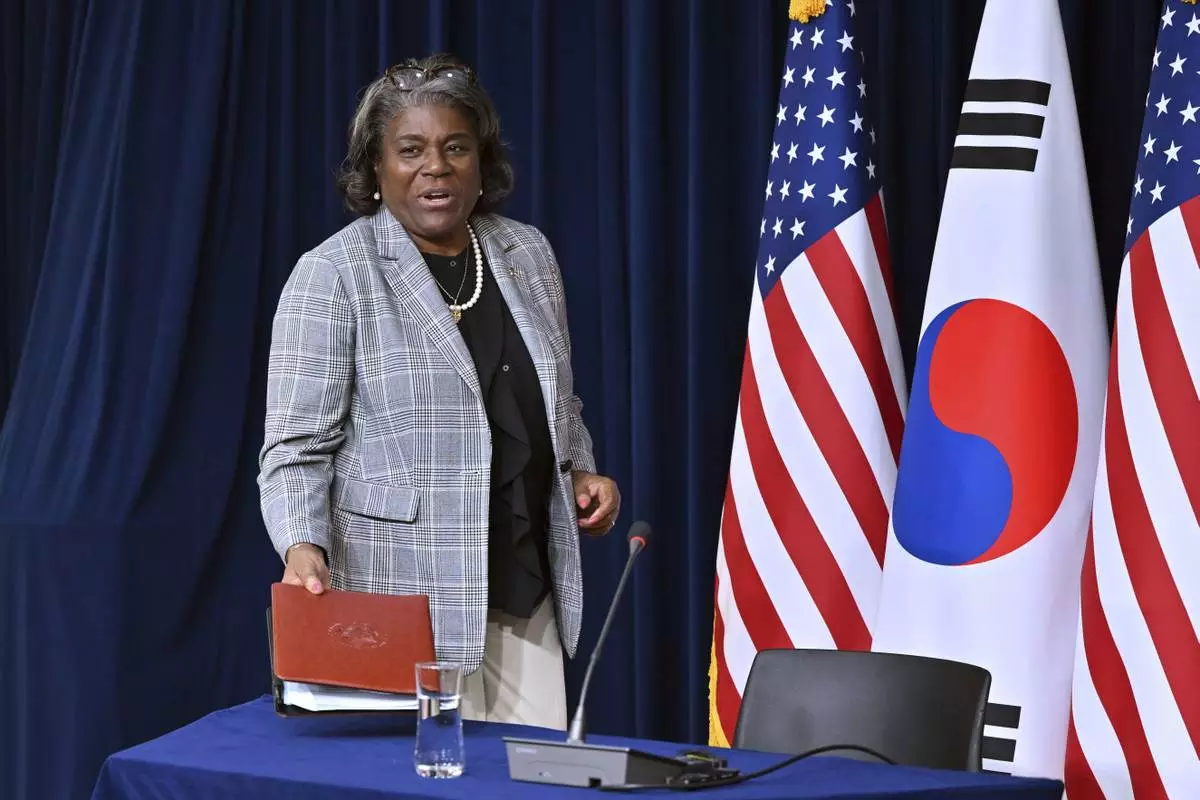
U.S. Ambassador to the United Nations Linda Thomas-Greenfield arrives to attend a press conference at the American Diplomacy House in Seoul Wednesday, April 17, 2024. (Jung Yeon-je/Pool Photo via AP)
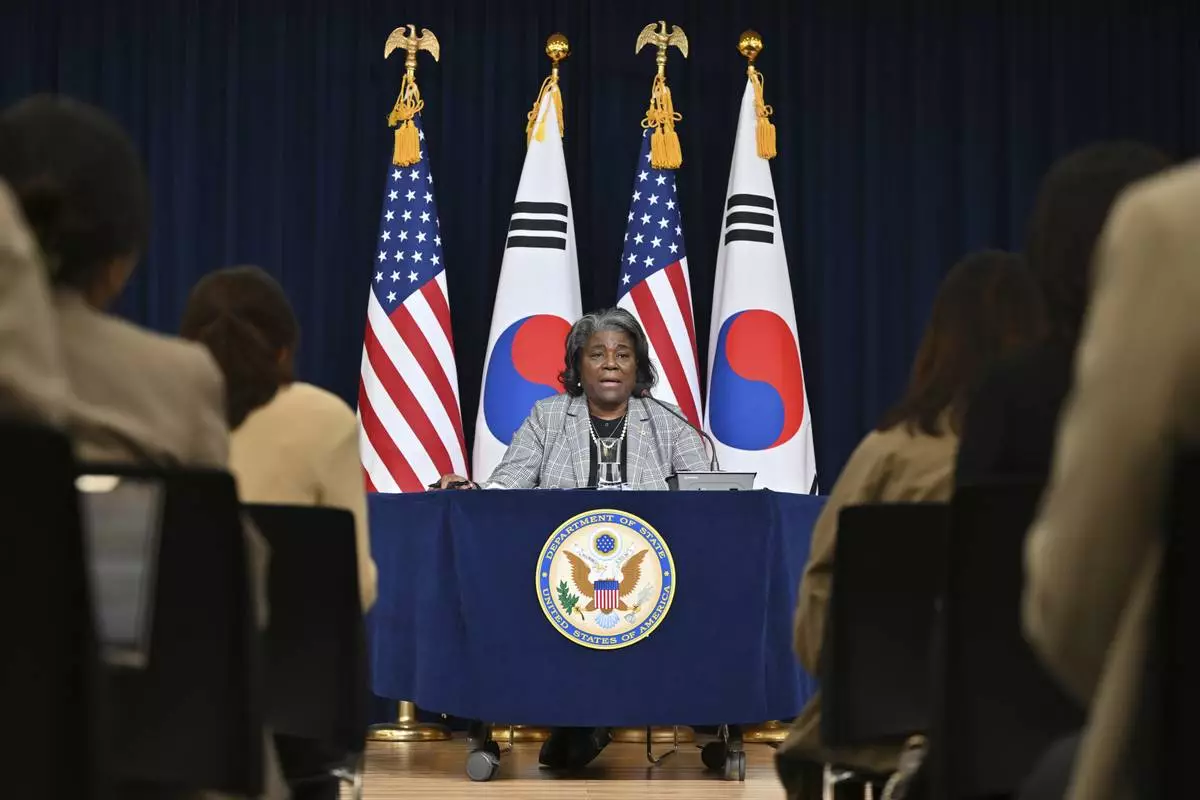
U.S. Ambassador to the United Nations Linda Thomas-Greenfield speaks during a press conference at the American Diplomacy House in Seoul Wednesday, April 17, 2024. (Jung Yeon-je/Pool Photo via AP)
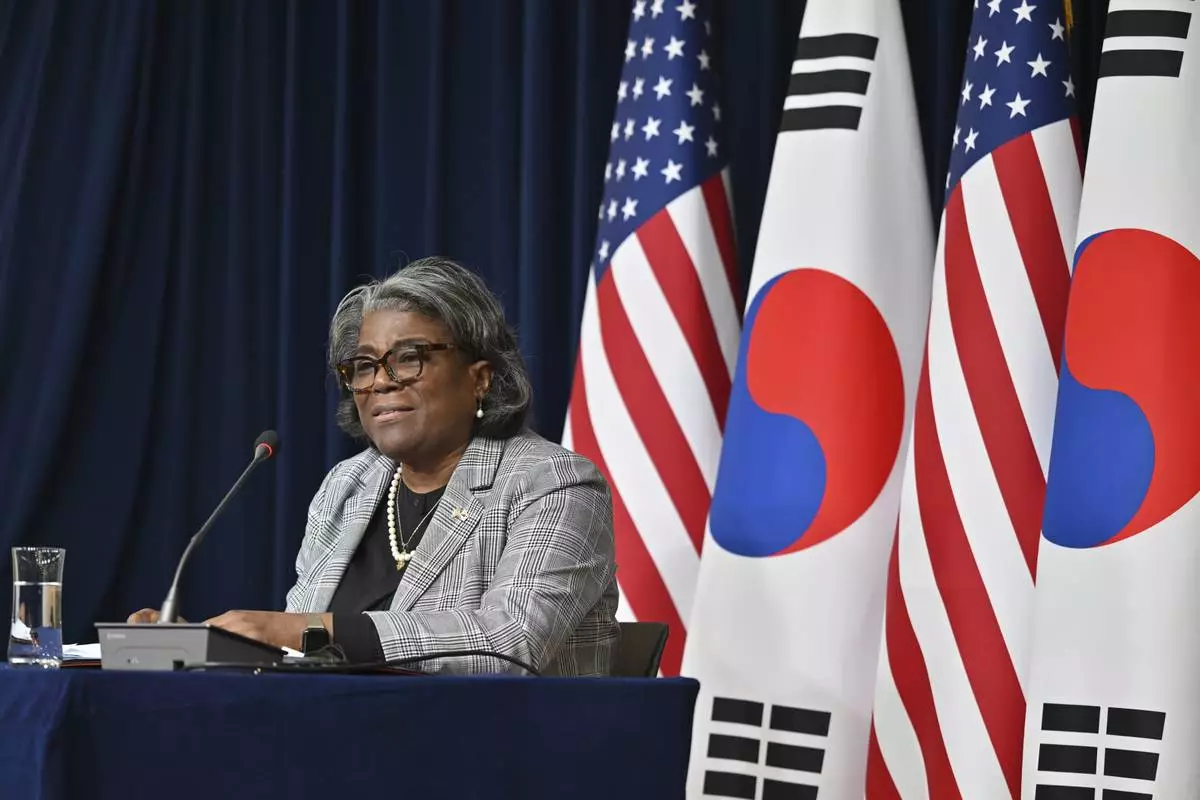
U.S. Ambassador to the United Nations Linda Thomas-Greenfield speaks during a press conference at the American Diplomacy House in Seoul Wednesday, April 17, 2024. (Jung Yeon-je/Pool Photo via AP)
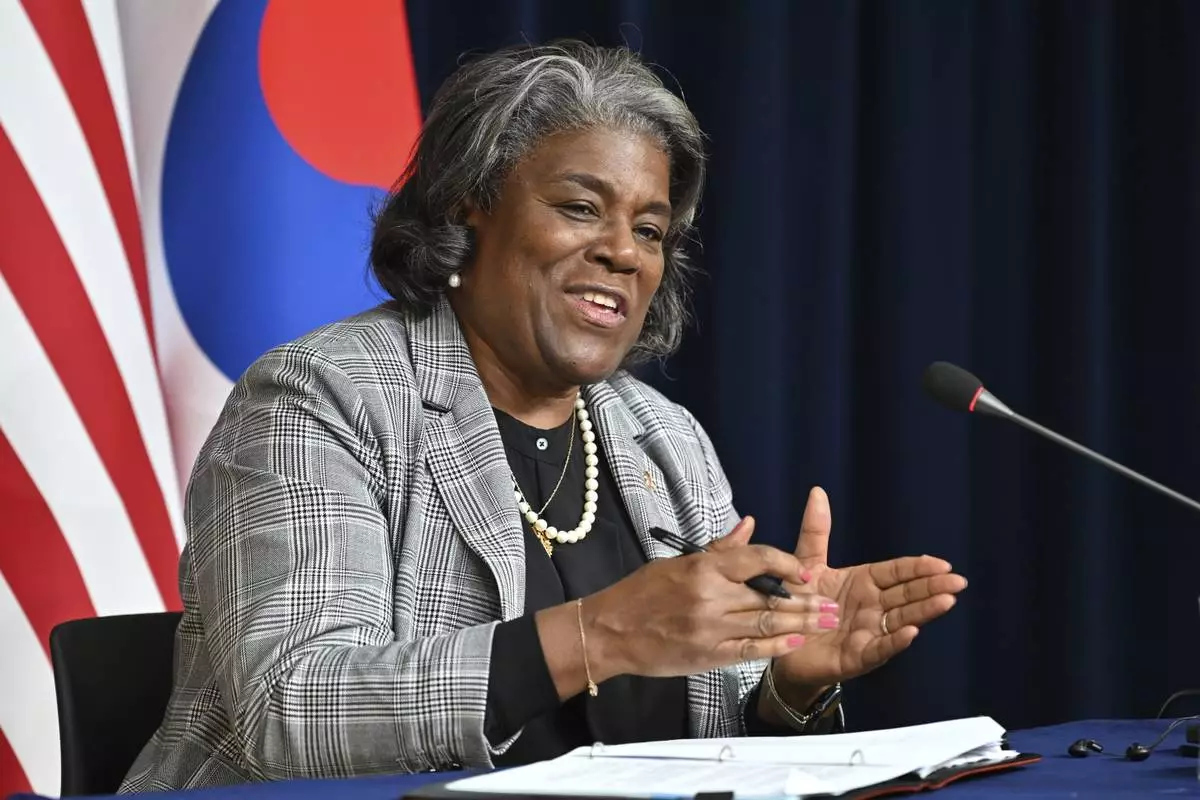
U.S. Ambassador to the United Nations Linda Thomas-Greenfield speaks during a press conference at the American Diplomacy House in Seoul Wednesday, April 17, 2024. (Jung Yeon-je/Pool Photo via AP)
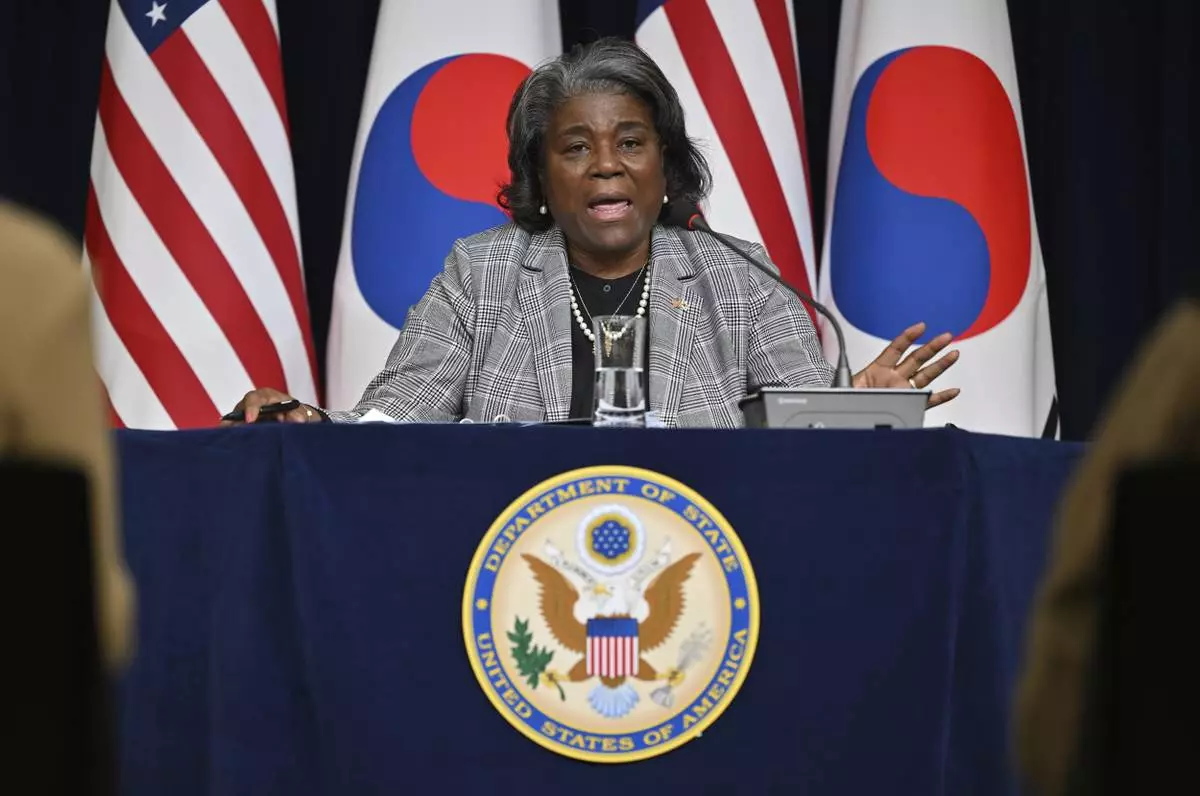
U.S. Ambassador to the United Nations Linda Thomas-Greenfield speaks during a press conference at the American Diplomacy House in Seoul Wednesday, April 17, 2024. (Jung Yeon-je/Pool Photo via AP)
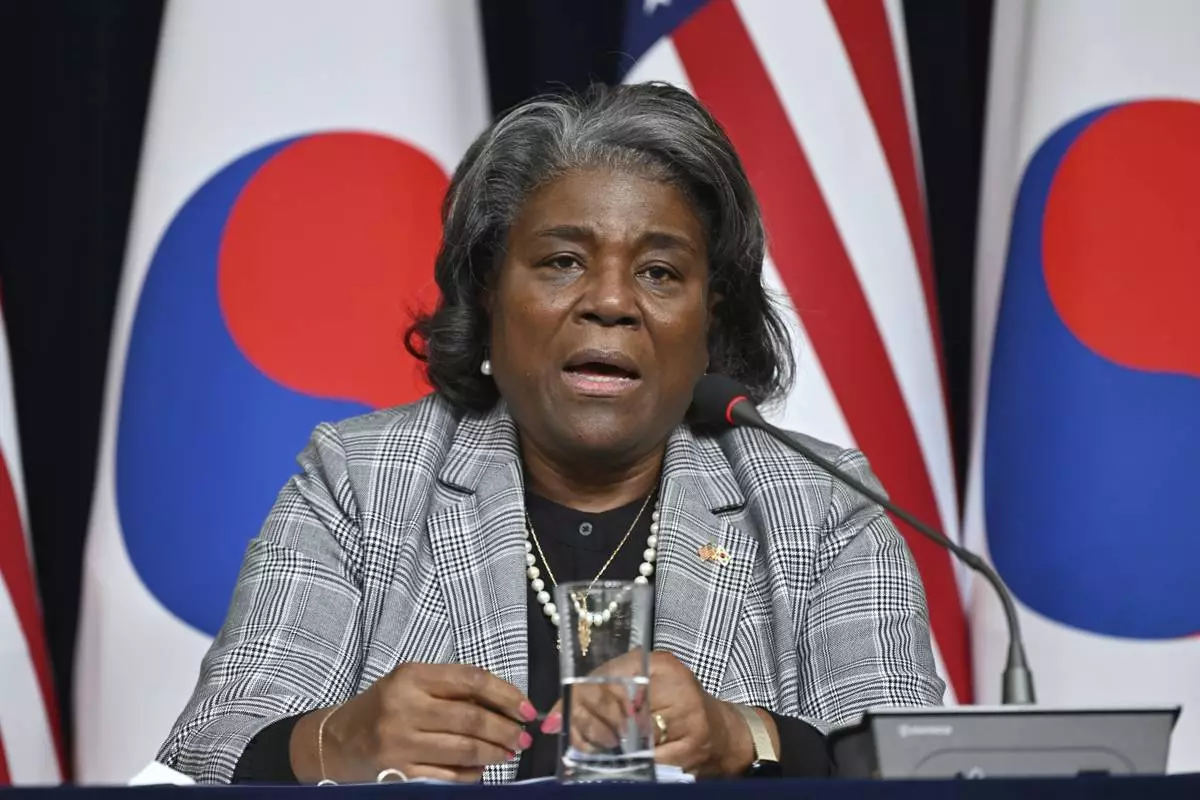
U.S. Ambassador to the United Nations Linda Thomas-Greenfield speaks during a press conference at the American Diplomacy House in Seoul Wednesday, April 17, 2024. (Jung Yeon-je/Pool Photo via AP)

















